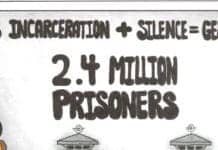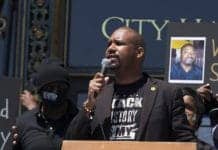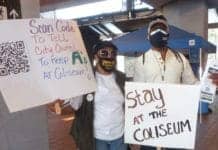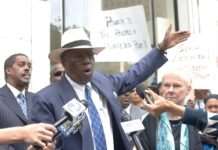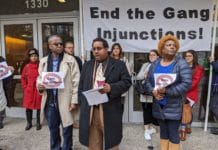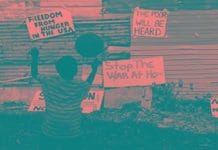by Chris Brizzard

“It was the beginning of the end,” said Daniel Landry, a community activist who has lived in the King Garvey Co-op since childhood. “Thirty years ago, there were some 600 Black businesses in the Western Addition. Today, you have maybe four or five.”
But in what today’s neoliberal climate seems like an almost unimaginable concession, the government did attempt to do something tangible for those affected by the urban renewal scheme. “King Garvey was established based on the impact of redevelopment and the government realizing that they had to make a great effort to bring some type of self-sufficiency to the very people that were being pushed out of the fabric of America,” said Landry.

But for the 211 shareholders of King Garvey, the majority of whom are elderly and receive Section 8 housing assistance, the path to achieving that dream has been riddled with obstacle after obstacle.
Residents of a housing co-op – called shareholders – own their complex and are responsible collectively for its management and mortgage. That takes a high level of awareness and involvement by the shareholders, a goal that has yet to be achieved at King Garvey.
“Many of the people didn’t know that their job is to monitor their directors, not just come and vote for someone who tells you they’re going to do a good job,” said Landry. “After you vote, it’s your duty to govern your board of directors and made sure that they are not representing their personal interests and are representing the co-op’s interests.”
Which raises the issue of the board of directors. “It’s the responsibility of the directors to help educate shareholders. Some directors haven’t been doing that. We have shareholders who haven’t received by-laws. They don’t even know it’s a co-op,” said Landry. “You may be there for years and think it’s no different than renting an apartment.”
Internal politics further complicate matters. “After we became a co-op, the problem was, and still is, that the board of directors could never get to a point where they were not fighting that internal strife,” said Landry. “Over that 30-year span, you had payoffs, rigged elections, intimidation, threats, lies, corruption, stealing and embezzlement.”
This has created an environment far removed from the notions of cooperation that King Garvey was founded on. “The information exchange system in King Garvey has been suppressed to the point where people just shut their doors and windows,” said Sharon Jones, a board member and long-time King Garvey resident who has spent all of her retirement money in the fight to save the co-op.
“We’ve been given reason to fear what might happen if we speak out. Plus, what we worked hard to achieve has been shot down so often people feel, ‘It’s never helped before, so I’ll stick to myself and hope for the best.’”
I met one shareholder who later requested a statement, in writing, that I would not use their name in this story.
But the shareholders and the board of directors do not exist in a vacuum. The seven-member board works closely with a management agent and, in theory, they and HUD all work together to ensure the success of King Garvey.
“HUD’s role with King Garvey is to keep the shareholders on the path of finishing this deal and not doing business practices that would prevent it from happening,” said Carlos Levexier, president of the King Garvey board of directors for the past two and a half years. “The management agent’s role is to manage the business side of the co-op. The board of directors oversees the management company,” he said.
But some believe that this relationship between HUD, the management agent and the board has actually endangered the co-op’s very existence.
“It’s what I call the ‘housing mafia,’ and it goes all the way to Washington,” said Jones. “HUD knows how to work these properties to maximize their distribution of taxpayer money into the hands of people who should never get it and not get it to people who are supposed to have it.”
A key way this is done is through the threat of foreclosure. Since its inception, King Garvey has been in a state of chronic disrepair, and by performing regular housing inspections, HUD keeps the threat of foreclosure looming over shareholders’ heads. The consequence for failing an inspection is the termination of the co-op’s Section 8 contract, and owners have been conditioned to believe that would mean the loss of ownership, because without Section 8, they’re told, they would no longer be able to pay off the mortgage.
“HUD has been threatening foreclosure for 15 years now,” said Landry. “They never foreclose. I’ve seen HUD normally raise the issue of inspection when they’re trying to achieve some political means.”
External agencies, typically involving HUD, the management agent and/or the City, then devise a plan to “save” the property. This plan is then touted as the only way out, thus putting great pressure on the board and shareholders to acquiesce.
“We relied on others to determine what we need because we felt incapable of coming up with a full plan on the level that they require,” said Jones. “But we can see what’s wrong and they can’t. They say it’s our decision, but if we don’t go with what they suggest, we’ll get an inspection and if we fail they will suspend our Section 8 contract,” she said.
And when board members start asking too many questions about these plans, funny things begin to happen.
The most recent example began three to four months ago, when the majority of the board began to question the latest plan put forth by HUD, the current management agent (John Stewart Co.) and the City – a $40 million property-repair loan that some say is unnecessary.

When one board member found that the $40 million plan would saddle King Garvey with massive amounts of debt, he was put under investigation and subsequently removed. “Everything was all good before he discovered that, first of all, we didn’t need $40 million. We could fix the whole co-op with $15 to $16 million, maybe less,” said Landry, which begs the question, “Where’s all the other money going?”
But it didn’t stop there. “The management agent began to support the minority of the board,” said Levexier, board president. “They hired an attorney for the minority of the board, who wrote a letter saying he represented the board of directors. But I had never met with him about that at all.”
On Aug. 28 and 29, King Garvey underwent another federal housing inspection … and failed. Two weeks later, on Sept. 11, the annual board election was held.
During that election, no third party was present to independently monitor the proceedings. Landry said that some candidates received call lists of shareholders and were thereby able to monitor who was showing up to vote. “When you have shareholders that are running the election, and they’re voting too, we need a third neutral party to monitor because we have a history of rigged elections,” said Landry.
Another of the many problems reported was with the election materials. There are about 65 Korean shareholders in King Garvey – enough to swing a vote one way or another – most of whom are fairly new to the co-op. Many of them have difficulty with English. Jones says that translations were made available to Korean shareholders when HUD came to threaten foreclosure and the loss of their Section 8 contract, and also to threaten the removal of certain board members. The elections, however, were a different story. “No ballot or election materials were available in Korean,” she said.
These events have only created further turmoil within King Garvey. “We had a meeting with the board that invalidated the election that took place,” said Levexier. “We are calling for a new election on Oct. 30.”
However, other board members have taken matters into their own hands, displaying the kind of cowboy diplomacy that has made George W. Bush famous. “Although [the election] was invalidated and the meeting to seat new directors was cancelled, four people nonetheless went into the community center, seated themselves, elected one another to be officers, and have now changed the locks to the community center,” said Jones.
The question of how King Garvey will now manage itself with a disputed election and a split board remains unclear. What is clear, however, is that the co-op is in serious need of help.
“We have not approved getting the $40 million refinancing and not even doing a cheaper form of it,” said Jones. “About $40,000 of [HUD-allocated] money has by now been spent on legal fees to help ensure King Garvey’s owners will be stuck with a deal requiring them to pay $82 million by Nov. 1, 2019, for a largely cosmetic rehab of premises that could totally be replaced for that price,” said Jones. “That’s why we need an attorney to stop them.”
And they need that attorney quick. Things are happening fast at King Garvey as HUD and its affiliates rush to get their plan through with as little opposition and awareness as possible.
Levexier, however, still has hope, and it lies with the people of King Garvey, who “in 12 years … could envision a situation where they have just become free and clear owners of property in San Francisco and achieve self-sufficiency,” he said. “That’s what this idea of King Garvey was designed for.”
This is Levexier’s “2020” vision, named for the year 2020 when King Garvey shareholders will have finally paid off their mortgage. To that end, he and several board members recently submitted their own plan to HUD, one based on energy efficiency and sustainability. He’s been talking with shareholders one on one, empowering them in the process. He’s also been trying to revise how people think about Section 8.
“In 1978, the mortgage was less than $200 per month per shareholder, but that was closer to the market rate then,” said Levexier. “Now, it’s 2007, and the mortgage is still at the 1978 rate. If they cut off Section 8, the people could already contribute more than it would cost to pay the mortgage.
“HUD can’t foreclose unless you don’t pay your mortgage,” he said. This takes the steam out of HUD’s foreclosure threats.
Considering the current political and economic climate, King Garvey is nothing less than an endangered species. “I’m under no illusion as to what’s taking place with the co-op and nationwide,” said Landry. “The developers’ true interest is profit and steamrolling anybody who doesn’t fit into that overall master plan.”
If the King Garvey Co-op does become extinct, you can bet that as the developers move in, the agencies involved will say something like, “Now that you’ve gone with our plan, life’s going to be a whole lot better. Just wait and see,” as high-rise market-rate condos, like the ones popping up all over the city, are built in its place. The unspoken assumption, however, is that few, if any, of the co-op’s 211 shareholders will be able to afford living there.
The King Garvey crisis speaks volumes about the realities of life in the wealthiest country on Earth, where achieving the American dream is possible for the “haves” and next to impossible for the “have-nots,” where the government, whose job it is to serve the people, ultimately works against them if they in fact become too democratic and self-empowered, and where the message which says, “We don’t want you here,” is continually thrust into the faces, and oftentimes the bodies, of certain groups of people deemed undesirable. It’s as American as apple pie. It’s up to us to fight against it.
Chris Brizzard is an intern at the Bay View. E-mail him at cepheus_1@msn.com.

 Store
Store




